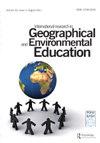Future geography teachers for the planet. Powerful (disciplinary) knowledge and education for sustainable development (ESD) in initial teacher education (ITE)
IF 3.1
Q2 EDUCATION & EDUCATIONAL RESEARCH
International Research in Geographical and Environmental Education
Pub Date : 2022-12-23
DOI:10.1080/10382046.2023.2158622
引用次数: 2
Abstract
Environmental sustainability is not a new issue, but the current imperatives the global community faces call for urgent action in building powerful knowledge of ESD in ITE. We are living in the geological age dubbed the Anthropocene to highlight this as the period during which human’s activities dominate the environment. Climate change as an (inter)generational global issue has moved masses of mostly young adults across the world. Protests, such as Fridays for Future have attracted young people and increased their political engagement, yet what they learn about climate and its dynamics at school is limited. Geography education is claimed as a key discipline that can impact on their knowledge, alongside parents and mass media as sources of information. As members of this scholarly community, we argue that there is an urgent need to better build powerful knowledge of ESD in teacher preparation so that teachers can confidently play a key role in helping young people understand and respond to the climate emergency. Over the last decades, IRGEE became a mirror of the expanding interests of Geography educators around the globe. While a broadening of our research interests takes place, historical meta-studies (for the German-speaking countries, cf. Bagoly-Simó & Hemmer, 2017) uncovered a range of topics that have held the uninterrupted attention of Geography educators. Along with map skills and spatial orientation, as a scholarly community, we tend to keep matters of geographical knowledge and ESD high on our agenda. Both the Lucerne Declaration on Geographical Education for Sustainable Development (Haubrich, Reinfried, & Schleicher, 2007) and the revisited International Charter on Geographical Education (IGU-CGE, 2016) documented our previous efforts and outlined possible future steps, recognizing the vital links between research in geography education and allied areas of education for sustainability. Indeed, equipping students with geographical knowledge suitable to both recognize less sustainable behavior and strive for viable alternative to achieve a more sustainable future, is one of the core contributions of Geography as a school subject to the education of young individuals. In contrast to other subjects, as empirical studies show, Geography has a strong conceptual (Bagoly-Simó, 2014) and thematic (Bagoly-Simó, 2013) affinity to sustainable development. Its objectives often overlap with those of ESD. However, the specifics of the nature of geographical knowledge required to make this significant contribution continue to require our attention. Notably in 2018 our scholarly community examined the prospects for ESD and signalled the need for further research (Chang & Kidman, 2018). Two years later, in IRGEE’s 2020 special issue, scholars reported on the GeoCapabilities approach which has powerful disciplinary knowledge at its heart. In this approach, Geography educators ask in what respect is geographical knowledge powerful. We take from the special issue that knowledge which builds young people’s capacity for geographical reasoning can be powerful in responding to a world that is changing, as indeed it is. A fertile typology of powerful geographical knowledge has been developed by Alaric Maude (2018) that can be applied in analyzing knowledge (e.g., Béneker & Palings, 2017). It seems to us that powerful (disciplinary) knowledge depends as much on how we teach.未来的地球地理老师。初级教师教育(ITE)中的强大(学科)知识和可持续发展教育(ESD)
环境可持续性并不是一个新问题,但国际社会目前面临的当务之急要求采取紧急行动,在ITE中建立强有力的ESD知识。我们生活在被称为人类世的地质时代,以强调这是人类活动主导环境的时期。气候变化作为一个(跨代)全球问题,已经打动了世界各地的大多数年轻人。“未来星期五”等抗议活动吸引了年轻人,增加了他们的政治参与,但他们在学校里对气候及其动态的了解有限。地理教育被认为是一门可以影响他们知识的关键学科,与家长和大众媒体一样也是信息来源。作为学术界的成员,我们认为,迫切需要在教师准备工作中更好地建立强有力的可持续发展教育知识,以便教师能够自信地在帮助年轻人理解和应对气候紧急情况方面发挥关键作用。在过去的几十年里,IRGEE成为全球地理教育工作者兴趣不断扩大的一面镜子。在我们的研究兴趣不断扩大的同时,历史元研究(针对德语国家,参见Bagoly-Simó&Hemmer,2017)揭示了一系列引起地理教育工作者不间断关注的主题。除了地图技能和空间定位外,作为一个学术界,我们倾向于将地理知识和可持续发展教育放在我们议程的首位。《关于地理教育促进可持续发展的卢塞恩宣言》(Haubrich,Reinfried,&Schleicher,2007)和重新修订的《国际地理教育宪章》(IGU-GE,2016)都记录了我们之前的努力,并概述了未来可能采取的步骤,承认地理教育研究与可持续教育相关领域之间的重要联系。事实上,让学生掌握地理知识,既能认识到不太可持续的行为,又能为实现更可持续的未来而努力寻找可行的替代方案,这是地理作为一门学校科目对年轻人教育的核心贡献之一。与其他学科相比,正如实证研究所示,地理学与可持续发展具有强烈的概念性(Bagoly-Simó,2014)和主题性(Bagoli-Simó,2013)。其目标往往与可持续发展教育的目标重叠。然而,作出这一重大贡献所需的地理知识的具体性质仍然需要我们注意。值得注意的是,2018年,我们的学术界研究了可持续发展教育的前景,并表示需要进一步研究(Chang&Kidman,2018)。两年后,在IRGEE 2020年的特刊中,学者们报道了以强大的学科知识为核心的GeoCapabilities方法。在这种方法中,地理教育者会问地理知识在什么方面强大。我们从特刊中了解到,建立年轻人地理推理能力的知识在应对一个正在变化的世界方面可能是强大的,事实上也是如此。Alaric Maude(2018)开发了一种丰富的强大地理知识类型,可用于分析知识(例如,Béneker&Palings,2017)。在我们看来,强大的(学科)知识在很大程度上取决于我们的教学方式。
本文章由计算机程序翻译,如有差异,请以英文原文为准。
求助全文
约1分钟内获得全文
求助全文
来源期刊

International Research in Geographical and Environmental Education
EDUCATION & EDUCATIONAL RESEARCH-
CiteScore
5.20
自引率
33.30%
发文量
11
期刊介绍:
International Research in Geographical & Environmental Education publishes quality research studies within the context of geographical and environmental education. The journal endeavours to promote international interest and dissemination of research in the field, provides a forum for critique, and demonstrates the relevance of research studies to good professional practice.
 求助内容:
求助内容: 应助结果提醒方式:
应助结果提醒方式:


